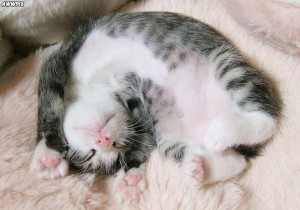What Makes Our Pets Itch
February 7, 2010 by LaBecs
Filed under What Makes Our Pets Itch
How awful it is when you get an itch in your back and you can’t get to it! Well, once in a while your dog or your cat needs to scratch an itch, and we have to investigate the reason why it is happening.
 What makes our pets itch? What causes itching skin on our dogs? An itch is a reaction to chemicals in the animal’s skin that makes him or her really want to scratch, and if you see your dog constantly scratching, it’s wise to find out what’s causing it. The itch can be triggered by anything from fleas and ticks, dry skin, allergies, bacterial infections, and even a serious disease, so it’s a good idea to look into it with the help of your vet. He or she will examine the pet and decide if more diagnostic tests are necessary. It might just be a matter of changing to special dog food for skin allergies or getting an anti itch dog shampoo. Treating them is important for your dog’s health. Cats can also have skin problems, but not as often as dogs do.
What makes our pets itch? What causes itching skin on our dogs? An itch is a reaction to chemicals in the animal’s skin that makes him or her really want to scratch, and if you see your dog constantly scratching, it’s wise to find out what’s causing it. The itch can be triggered by anything from fleas and ticks, dry skin, allergies, bacterial infections, and even a serious disease, so it’s a good idea to look into it with the help of your vet. He or she will examine the pet and decide if more diagnostic tests are necessary. It might just be a matter of changing to special dog food for skin allergies or getting an anti itch dog shampoo. Treating them is important for your dog’s health. Cats can also have skin problems, but not as often as dogs do.
Once your vet has ruled out any serious problems, here are some of the things you can do to help alleviate their itchy skin:
Check the food they’re eating. If you use commercial food, try to get a premium brand nutritionally balanced and give them a supplement of Omega-3 fatty acids. There are special supplements for dogs and cats, but you can give them the same fish oil you take. One 1000 mg. capsule once a day is enough. Use only half for small dogs and cats. If you are not comfortable giving such a large capsule especially to your dog, just puncture one end and mix it with some of his food. Do the same for small dogs and cats. If the taste or the smell is too much for them, you can always use some olive oil to coat their food.
Give them a bath, or at least, give the dog a bath. But make sure the water is not warm or hot. Cool water will give him some relief, but hot water will just make it worse. Use an oatmeal shampoo or one specially formulated for dry skin in dogs or cats. Also use a moisturizing rinse afterwards. Your vet might have given you a specific shampoo or conditioner to reduce any bacteria on the skin. When you’re done, pat him dry with a towel, don’t rub since this would just further irritate the skin. You can then use a skin tonic with herbal extracts to sooth the itch afterwards.
Treat them with oatmeal. Mix oatmeal and water, apply the paste to the irritated area and cover it with a warm towel to sooth the itch. If possible, try to keep your dog or cat calm for a little while for the soothing effect to work and repeat the process every day until there’s improvement.
You can also apply a few drops of vitamin E on the spot for relief. And remember to brush them frequently, since this releases the natural oils in the skin. But try to do it  very softly while the irritation still exists or avoid it altogether until it heals.
very softly while the irritation still exists or avoid it altogether until it heals.
Remember that you should always consult your vet before deciding on a natural remedy as a skin and coat treatment.
Some last tips:
If your vet determined that it’s an allergy, he might have prescribed antihistamines to control it, but make sure to watch your pet’s reaction. Some pets might get over excited, and others might get drowsy. This should help you decide whether to give it in the morning or late at night.
If the vet prescribed antibiotics to control a skin infection caused by so much scratching, make sure you give him the whole treatment and don’t miss any doses. An infection that is not well treated can be fatal.
Avoid fleas at all costs! Flea control is essential for your dog’s health and well being, and they can be a cause for the irritation that causes the scratching. If your cat is allowed to go outside, make sure you treat him too. There are many treatments to prevent and keep away fleas and ticks. Make sure you talk to your vet about it.
What to do when your pet has an itch to scratch
How awful it is when you get an itch in your back and you can’t get to it!Well, once in a while your dog or your cat needs to scratch an itch, and we have to investigate the reason why it is happening.
An itch is a reaction to chemicals in the animal’s skin that makes him or her really want to scratch, and if they’re scratching more than normal, it’s wise to find out what’s causing it. The itch can be triggered by anything from fleas and ticks, dry skin, allergies, bacterial infections, and even a serious disease, so it’s a good idea to look into it with the help of your vet. He or she will examine the pet and decide if more diagnostic tests are necessary.
Once your vet has ruled out any serious problems, here are some of the things you can do to help alleviate their itchy skin:
Check the food they’re eating. If you use commercial food, try to get a premium brand nutritionally balanced and give them a supplement of Omega-3 fatty acids. There are special supplements for dogs and cats, but you can give them the same fish oil you take. One 1000 mg. capsule once a day is enough. Use only half for small dogs and cats. If you are not comfortable giving such a large capsule especially to your dog, just puncture one end and mix it with some of his food. Do the same for small dogs and cats. If the taste or the smell is too much for them, you can always use some olive oil to coat their food.
Give them a bath, or at least, give the dog a bath. But make sure the water is not warm or hot. Cool water will give him some relief, but hot water will just make it worse. Use an oatmeal shampoo or one specially formulated for dry skin in dogs or cats. Also use a moisturizing rinse afterwards. Your vet might have given you a specific shampoo or conditioner to reduce any bacteria on the skin. When you’re done, pat him dry with a towel, don’t rub since this would just further irritate the skin. You can then use a skin tonic with herbal extracts to sooth the itch afterwards.
Treat them with oatmeal. Mix oatmeal and water, apply the paste to the irritated area and cover it with a warm towel to sooth the itch. If possible, try to keep your dog or cat calm for a little while for the soothing effect to work and repeat the process every day until there’s improvement.
You can also apply a few drops of vitamin E on the spot for relief. And remember to brush them frequently, since this releases the natural oils in the skin. But try to do it very softly while the irritation still exists or avoid it all together until it heals..
Remember that you should always consult your vet before deciding on a natural remedy as a skin and coat treatment.
Some more tips:
If your vet determined that it’s an allergy, he might have prescribed antihistamines to control it, but make sure to watch your pet’s reaction. Some pets might get over excited, and others might get drowsy. This should help you decide whether to give it in the morning or late at night.
If the vet prescribed antibiotics to control a skin infection caused by so much scratching, make sure you give him the whole treatment and don’t miss any doses. An infection that is not well treated can be fatal.
Avoid fleas at all costs! Flea control is essential for your dog’s health and well being, and they can be a cause for the irritation that causes the scratching. If your cat is allowed to go outside, make sure you treat him too. There are many treatments to prevent and keep away fleas and ticks. Make sure you talk to your vet about it.
Neutering or Spaying Your New Kitten
March 13, 2009 by LaBecs
Filed under Neutering or Spaying Your New Kitten
There are just too many cats that are either homeless or feral, and people are starting to notice that it is important to neuter their pet cats. Cats mature quickly and can reproduce several times every year, so two feral cats can soon produce twenty or more.
Most feral cats are often pet cats who were not neutered or spayed, and released by their owners when they couldn’t take care of them any longer. Feral cats live in colonies, and they can spread diseases to any pet dogs and cats in their vicinity. Even if they are otherwise healthy, they may be flea-infested. When the females come into heat, the colony can disrupt the sleep of an entire neighborhood with their crying and fighting. Cats who are hungry enough will raid garbage cans. Feral kittens can destroy landscaping and soil your yard or outdoor furniture. Neutering or spaying your new kitten in the long run can obviously reduce the number of unwanted kittens that are produced, but it also can provide other benefits. A female cat in heat is very loud. Her crying is quickly drowned out by the fighting and yowling of any local tom cats in the vicinity. Toms that are not neutered tend to roam far away from home if they are allowed outdoors and may get injured or killed. Unaltered tomcats that are kept indoors or outdoors will tend to mark all objects in their territory with urine, which is extremely strong-smelling.
Cats who are unaltered may come down with some types of cancers more frequently than altered cats. These cancers affect the reproductive organs. They are extremely rare in cats that have been altered by the age of one year. Unaltered cats may also catch any of several contagious diseases of the reproductive tract.

Stretch
Unlike some animals, neutering or spaying your new kitten can be done at a very young age. Some humane societies and rescue groups recommend altering kittens at the age of eight weeks. Many veterinarians, however, suggest you wait until five or six months of age in most cases. The exceptions may be feral kittens who are trapped and then taken to be altered before being re-released to their colonies. By the time they are five or six months old, they may already be pregnant.
However, that doesn’t mean that you can’t alter your adult cat, it is just better to do it as young as possible.
If you have both male and female kittens in your home, you may want to neuter the males at a younger age, and wait until the girls are around six months old. This is recommended in many cases because the procedure is more difficult for females than males.
Most cats rarely have any problems after neutering, but sometimes incisions can become infected. Be sure to check your cat daily to make sure the incision is healing well. Symptoms of infection are puffiness and redness around the incision site. If your cat is licking or chewing at the stitches, you may need to have the cat wear an Elizabethan collar. This will prevent them from being able to reach the stitches. Male cats can go about their business quickly after the surgery, while females should be kept indoors for up to five days afterwards as they may injure themselves.
As with any type of surgery, there are some risks. In very, very rare occasions, cats might be allergic or have a fatal reaction to the anesthesia. However, statistically, the risk is minimal.
Neutering or spaying your new kitten is really a rather simple procedure. With a little extra care during recovery, your pet will have a happy, healthy life without worrying about unwanted litters and reproductive health.
Vaccinating Your New Kitten
March 13, 2009 by LaBecs
Filed under Vaccinating Your New Kitten
Your veterinarian will recommend that your kitten come back in two to four weeks for a second dose of FVRCPC and a second FIP and FLV vaccine. If he was wormed at his first visit, he will receive a second treatment. If your kitten is at least 12 weeks old, he will also get his first rabies shot at this visit.
Your kitten needs to come back a third time between the ages of ten to sixteen weeks. He will get a third FVRCPC shot at this time. If your kitten was too young to get a rabies vaccine at the last visit, he will get one this time.
When your kitten has gotten his third set of FVRCPC inoculations, he is home free until he reaches a year of age. At one year old, he will need another FVRCPC vaccination and another rabies. If he gets his second rabies shot within a year of the first, he will then be safe for three years. The FVRCPC needs to be given every year, however. If your kitten got vaccinations for FIP and Feline Leukemia, he will get booster shots for them at his one year visit to the veterinarian.
Vaccinating your new kitten is safe, but some cats do have side effects on occasion. Feline Leukemia vaccinations can sometimes be the cause of a form of cancer that may develop at the site of the injection.
This is the main reason many veterinarians do not recommend the vaccine if cats are not at risk of contracting it. Some vaccines may create tumors at the injection site. Most of the time, these tumors can be surgically removed before they spread through the cat’s system. This is a very rare side effect; the risk of your cat catching the disease the vaccine prevents is much higher than this side effect. If you notice a small lump forming at the injection site, let your vet know. These lumps are usually a sign of a simple reaction to the vaccine, but in rare instances, they can develop into a tumor.
Vaccinating your new kitten will help keep him or her healthy by preventing many diseases that may be debilitating at best or fatal at worst. It is easy to protect your cat against these dangers to their health with a few short trips to the vet. Do yourself and your cats a favor and protect them with vaccinations.
Mistakes New Cat Owners Shouldn’t Make
March 13, 2009 by LaBecs
Filed under Mistakes New Cat Owners Shouldn't Make
Getting a cat is a big step and there are some mistakes one should avoid. Cats have a reputation for taking care of themselves, but that doesn’t mean they don’t need any care. Before deciding to adopt that beautiful kitten, take the time to do some homework, thus avoiding these common mistakes made by new cat owners. That way you will have a happier and healthier cat and a long-term companionship with another living being, the like of which you never dreamed.
Adopting in a Rush
If you feel the impulse to buy a new shirt, or a new pair of shoes, you can always return it if it doesn’t fit right or if it’s the wrong color. But adopting a living creature like a cat or kitten, that will become a family member, is a different matter.
Adopting a new cat should be for keeps, so consider carefully before you make that decision.
You need to know that it’s going to cost money to support it. You have to get toys, food, litter boxes, veterinary visits, etc. You owe it to your new cat to take care of his basic needs, as well as being prepared for emergencies.
Not Spay or Neuter a New Cat
People who failed to spay or neuter their cats always complain of male cats spraying every available surface of the house or escaping outdoors to fight other male cats; female cats who keep the whole family awake with their loud yowling during estrus; and worse yet, “surprise” litters of unwanted kittens. Society faces an overwhelming cat population problem and that is reason enough to spay and neuter. Spaying or neutering your cat will also have many health advantages, so you have no reason not to do it.
Not Giving Needed Veterinary Treatment
Cats may quickly recover from minor illnesses, but they can also die if an emergency isn’t recognized. Cats need vaccinations, annual examinations, and they definitely need and deserve immediate veterinary care when they become sick or injured.
First Thing to do is choosing a good veterinarian.
Wrong Cat Food Choices

Anastasia
You might save some money by buying cheap cat food, but then you’ll have to spend much more on veterinary care. Cats are carnivores and need a good source of meat protein. They do not need large amounts of grain fillers, especially corn, which is a cheap source of protein used by many cat food manufacturers. Learn how to choose cat food and select the best brands you can afford. Your cat might eat less of the high quality food because they don’t have to gorge to get the nutrients they need.
Declawing Without All the Facts
Many innocent new cat owners have been convinced to declaw when a veterinarian asks: “Do you want your kitten declawed when we spay her?” Some veterinarians consider declawing a “routine” surgery, but cat advocates consider it cruel, inhumane, and unnecessary in almost every case and I totally agree. Learn the facts so that you can make an informed decision.
Allowing a Cat to Roam Free Outdoors
Many people believe cats are happier being free, breathing fresh air, and basking in the sunshine of an outdoor life, while many others can assure you that cats can be very happy and healthy living totally indoors. The outdoors offers dangers not found inside and that cannot be denied. Fortunately, there are many compromises that will give you and your cat the best of both worlds, while keeping him or her safe and happy.
Poor Litter Box Maintenance
Cats will always use their litter box, as long as it’s kept very clean, and the litter is not scented or unpleasant to the cats’ feet. Carefully maintaining your cat’s litter box will almost always guarantee you that you will not be faced with litter box avoidance problems.
However, if your cat suddenly starts urinating outside the box despite your careful maintenance, you should immediately have it checked for a urinary tract problem with your veterinarian.
A Cat is Not Property
When you join the ranks of cat lovers, you’ll find that we refer to our cats as family members, rather than “pets.” While cats may legally be considered “property” in some jurisdictions, the term ends there. If you haven’t figured out the distinction by now, your new cat will let you know in no uncertain terms. In fact, many cat lovers describe themselves as being owned by their cats!
Ignoring them
We always hear that cats are independent and should just be left alone. You will soon find out that they are very loving creatures that long for their human’s company. They will follow you around like a puppy, and will want to play with you. Play with them to keep them sharp and interested. The more toys they have the better, and you don’t have to spend a fortune. You’ll find how to make cheap toys in later articles.
Not Allowing a Cat to Be a Cat
Cats’ unique ways make them the endearing creatures they are. Some of their traits, however, may cause frustration because we don’t understand their needs. Cats instinctively seek out high places and sharpen their claws because they are cats, not because they are stubborn and disobedient. Our job is to accommodate those needs in acceptable ways.
Forcing your Love on them
They are sooo cute!!!! You just want to eat them up, hug them and squeeze them. But this is the fastest way to annoy them and make it harder to bond with them in the long run. Although many cats are all for it, many others are not quite as eager to be hugged. Take your cues from them, they will let you know what they like, never doubt that.


